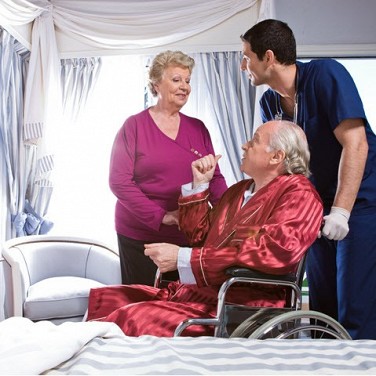
In a world where compassion and care are at the forefront of our moral values, there exists an obligation to ensure the well-being of every individual, especially the elderly residing in senior homes. One of the fundamental aspects of this care is the provision of nourishing and wholesome meals. In this article, we will delve into the importance of providing food to the elderly in senior homes, emphasizing the moral responsibility that underpins this obligation.
The vulnerability of elderly residents
Senior homes cater to a population that often faces physical limitations, cognitive decline, and various health challenges. Many residents are no longer able to prepare meals for themselves, which makes them reliant on the facility's staff to meet their nutritional needs. Failing to provide proper sustenance can lead to malnutrition, weakened immune systems, and a decline in overall health.
Find YOUR ideal care home NOW!
The right to dignified living
Every individual, regardless of age, deserves to live with dignity. Part of upholding this dignity involves ensuring that basic needs, such as food, are met adequately. Elderly residents have the right to receive meals that are not only nutritionally balanced but also prepared and served in a manner that preserves their dignity and respects their preferences.
Health and well-being
Nutrition plays a pivotal role in the health and well-being of elderly individuals. Adequate nourishment helps maintain muscle mass, bone density, and cognitive function. It also aids in the prevention of common health issues, such as pressure ulcers and infections, which are more prevalent among the elderly. By providing well-balanced meals, senior homes contribute to the overall health of their residents.
The social aspect
Meals in senior homes are not just about sustenance; they are also a time for social interaction. Sharing a meal with fellow residents fosters a sense of community and combats feelings of isolation and loneliness, which can be prevalent among the elderly. It creates an environment where residents can form connections, share stories, and build meaningful relationships.
Meeting dietary needs
It's crucial for senior homes to recognize the diverse dietary needs of their residents. Many elderly individuals have specific dietary restrictions or preferences due to medical conditions, allergies, or cultural backgrounds. Facilities must tailor their meal plans to accommodate these needs, ensuring that every resident receives appropriate and enjoyable meals.
Regulatory obligations
In many countries, senior homes are subject to strict regulations governing the care and services they provide to residents. These regulations often include guidelines for food preparation, nutrition, and meal quality. Compliance with these regulations is not only a legal requirement but also a moral one, reflecting the commitment to the residents' well-being.
Senior Home Meal Planning Guidelines
| Guideline | Reason | Implementation |
|---|---|---|
| Provide Nutrient-Dense Meals | Ensures seniors get essential vitamins and minerals | Incorporate lean proteins, whole grains, and fresh produce |
| Accommodate Dietary Restrictions | Prevents allergic reactions and ensures personal preferences | Offer diabetic-friendly, low-sodium, and culturally inclusive options |
| Encourage Hydration | Reduces dehydration risk, especially in elderly individuals | Provide easy access to water and hydrating foods throughout the day |
| Focus on Meal Presentation | Enhances appetite and enjoyment of meals | Use colorful plates and attractive food arrangements |
| Facilitate Social Dining | Reduces loneliness and enhances overall well-being | Encourage group meals and communal dining spaces |
| Regularly Review Menus | Ensures variety and adaptation to residents' changing needs | Conduct resident surveys and consult dietitians for menu adjustments |
The obligation to provide food to the elderly in senior homes extends far beyond the realms of legality—it is a moral imperative rooted in compassion, respect, and the principles of dignified living. Ensuring that elderly residents receive nourishing meals not only supports their physical health but also addresses their emotional and social needs. It is a testament to our shared responsibility as a society to care for and protect those who are most vulnerable among us, reaffirming the fundamental belief in the inherent worth and dignity of every individual, regardless of age.
FAQ:
Why is nutrition important in senior care homes?
Nutrition supports elderly residents' physical and cognitive health, prevents malnutrition, and enhances their overall quality of life. Balanced meals also help manage chronic illnesses like diabetes and heart disease.
How do senior homes accommodate dietary restrictions?
Senior homes work with dietitians to provide personalized meal plans. These may include diabetic-friendly, gluten-free, vegetarian, and culturally specific meals based on individual needs.
What happens if an elderly resident is malnourished?
Malnourishment can lead to muscle weakness, immune deficiencies, and increased risk of infections. Senior care homes must regularly assess residents’ nutrition and adjust meal plans accordingly.
How can meals improve social interaction in care homes?
Mealtime serves as an opportunity for residents to interact, form friendships, and combat loneliness. Facilities often arrange communal dining areas and group meal events to encourage socialization.
Are there regulations regarding food quality in senior homes?
Yes, many countries have strict regulations for senior home food services, ensuring meals meet dietary and health standards. Compliance with these guidelines ensures residents receive proper nutrition and care.
We are here to help you choose a care home or facility best suited to your needs. Do not hesitate to contact us on the following number: 0230 608 0055 or fill out this form.
Do you need a care home for yourself or your loved one?
Share this article :
Latest posts
You are looking for an establishment for your loved one ?
Get availability & prices
Fill in this form and receive
all the essential information
We would like to inform you of the existence of the opposition list for telephone canvassing.

.webp)









